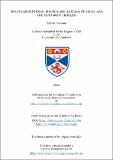Files in this item
Multi-descriptional physicalism, level(s) of being, and the mind-body problem
Item metadata
| dc.contributor.advisor | Ball, Derek Nelson | |
| dc.contributor.advisor | Cotnoir, A. J. | |
| dc.contributor.advisor | Paul, L. A. | |
| dc.contributor.author | Ioannou, Savvas | |
| dc.coverage.spatial | 225 p. | en_US |
| dc.date.accessioned | 2022-06-13T13:56:09Z | |
| dc.date.available | 2022-06-13T13:56:09Z | |
| dc.date.issued | 2022-06-13 | |
| dc.identifier.uri | https://hdl.handle.net/10023/25521 | |
| dc.description.abstract | The main idea of this thesis is multi-descriptional physicalism. According to it, only physical entities are elements of our ontology, and there are different ways to describe them. Higher-level vocabularies (e.g., mental, neurological, biological) truly describe reality. Sentences about higher-level entities are made true by physical entities. Every chapter will develop multi-descriptional physicalism or defend it from objections. In chapter 1, I will propose a new conceptual reductive account that conceptually reduces higher-level entities to physical entities. This conceptual reductive account combines resources from Heil’s truthmaker theory and either a priori physicalism or a posteriori physicalism. In chapter 2, I apply this conceptual reductive account to various debates. Physicalism, the multiple-realisability argument, the prototype theory of concepts, and truthmaker explanations will be discussed. In chapter 3, I will argue that a major aim of metaphysics should be to discover which entities are fundamental and explain why they suffice for the existence of derivative entities. In chapter 4, I will propose a new way to explain why sentences apparently about composite objects are true even though there are no composite objects. It combines resources from Cameron’s truthmaker theory and van Inwagen’s paraphrase strategy. In chapter 5, I will argue that the intuition that the mind and the body are very different does not show that the mind is distinct from the body. This intuition can be explained away by mentioning our dispositions to give non-physical explanations when we are ignorant of physical facts. In chapter 6, I will examine two arguments for the existence of a metaphysically independent level, and I will argue that only a modified version of one of them succeeds. I will argue that methodological principles support the view that there is a metaphysically independent level. | en_US |
| dc.language.iso | en | en_US |
| dc.rights | Creative Commons Attribution 4.0 International | * |
| dc.rights.uri | http://creativecommons.org/licenses/by/4.0/ | * |
| dc.subject.lcc | B825.I7 | |
| dc.subject.lcsh | Materialism | en |
| dc.subject.lcsh | Reality | en |
| dc.subject.lcsh | Mind and body | en |
| dc.title | Multi-descriptional physicalism, level(s) of being, and the mind-body problem | en_US |
| dc.type | Thesis | en_US |
| dc.type.qualificationlevel | Doctoral | en_US |
| dc.type.qualificationname | PhD Doctor of Philosophy | en_US |
| dc.publisher.institution | The University of St Andrews | en_US |
| dc.identifier.doi | https://doi.org/10.17630/sta/182 |
The following licence files are associated with this item:
This item appears in the following Collection(s)
Except where otherwise noted within the work, this item's licence for re-use is described as Creative Commons Attribution 4.0 International
Items in the St Andrews Research Repository are protected by copyright, with all rights reserved, unless otherwise indicated.


